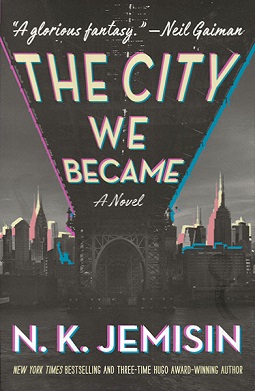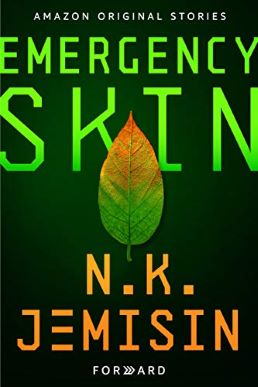
Gene Rodman Wolfe was an American science fiction and fantasy writer. He was noted for his dense, allusive prose as well as the strong influence of his Catholic faith. He was a prolific short story writer and novelist, and won many literary awards. Wolfe has been called "the Melville of science fiction", and was honored as a Grand Master by the Science Fiction and Fantasy Writers of America.

Afrofuturism is a cultural aesthetic, philosophy of science, and history that explores the intersection of the African diaspora culture with science and technology. It addresses themes and concerns of the African diaspora through technoculture and speculative fiction, encompassing a range of media and artists with a shared interest in envisioning black futures that stem from Afro-diasporic experiences. While Afrofuturism is most commonly associated with science fiction, it can also encompass other speculative genres such as fantasy, alternate history, and magic realism. The term was coined by Mark Dery, an American Cultural critic in 1993 and explored in the late 1990s through conversations led by Alondra Nelson.
Locus: The Magazine of The Science Fiction & Fantasy Field, founded in 1968, is an American magazine published monthly in Oakland, California. It is the news organ and trade journal for the English-language science fiction and fantasy fields. It also publishes comprehensive listings of all new books published in the genres. The magazine also presents the annual Locus Awards. Locus Online was launched in April 1997, as a semi-autonomous web version of Locus Magazine.

Nnedimma Nkemdili "Nnedi" Okorafor is a Nigerian American writer of science fiction and fantasy for both children and adults. She is best known for her Binti Series and her novels Who Fears Death, Zahrah the Windseeker, Akata Witch, Akata Warrior, Lagoon and Remote Control. She has also written for comics and film.

Martha Wells is an American writer of speculative fiction. She has published a number of fantasy novels, young adult novels, media tie-ins, short stories, and nonfiction essays on fantasy and science fiction subjects. Her novels have been translated into twelve languages. Wells has won four Hugo Awards, two Nebula Awards and three Locus Awards for her science fiction series The Murderbot Diaries. She is also known for her fantasy series Ile-Rien and The Books of the Raksura. Wells is praised for the complex, realistically detailed societies she creates; this is often credited to her academic background in anthropology.

Black science fiction or black speculative fiction is an umbrella term that covers a variety of activities within the science fiction, fantasy, and horror genres where people of the African diaspora take part or are depicted. Some of its defining characteristics include a critique of the social structures leading to black oppression paired with an investment in social change. Black science fiction is "fed by technology but not led by it." This means that black science fiction often explores with human engagement with technology instead of technology as an innate good.
Dark Matter is an anthology series of science fiction, fantasy, and horror stories and essays produced by people of African descent. The editor of the series is Sheree Thomas. The first book in the series, Dark Matter: A Century of Speculative Fiction from the African Diaspora (2000), won the 2001 World Fantasy Award for Best Anthology. The second book in the Dark Matter series, Dark Matter: Reading the Bones (2004), won the World Fantasy Award for Best Anthology in 2005. A forthcoming third book in the series is tentatively named Dark Matter: Africa Rising. This was finally published at the end of 2022 under the title Africa Risen: A New Era of Speculative Fiction, from Tor Books.

Nora Keita Jemisin is an American science fiction and fantasy writer. Her fiction includes a wide range of themes, notably cultural conflict and oppression. Her debut novel, The Hundred Thousand Kingdoms, and the subsequent books in her Inheritance Trilogy received critical acclaim. She has won several awards for her work, including the Locus Award. The three books of her Broken Earth series made her the first author to win the Hugo Award for Best Novel in three consecutive years, as well as the first to win for all three novels in a trilogy. She won a fourth Hugo Award, for Best Novelette, in 2020 for Emergency Skin. Jemisin was a recipient of the MacArthur Fellows Program Genius Grant in 2020.

Amal El-Mohtar is a Canadian poet and writer of speculative fiction. She has published short fiction, poetry, essays and reviews, and has edited the fantastic poetry quarterly magazine Goblin Fruit since 2006.
Sarah Pinsker is an American science fiction and fantasy author. She is a nine-time finalist for the Nebula Award, and her debut novel A Song for a New Day won the 2019 Nebula for Best Novel while her story Our Lady of the Open Road won 2016 award for Best Novelette. Her novelette "Two Truths and a Lie" received both the Nebula Award and the Hugo Award. Her fiction has also won the Philip K. Dick Award, the Theodore Sturgeon Memorial Award and been a finalist for the Hugo, World Fantasy, and Tiptree Awards.

Sam J. Miller is an American science fiction, fantasy and horror short fiction author. His stories have appeared in publications such as Clarkesworld, Asimov's Science Fiction, and Lightspeed, along with over 15 "year's best" story collections. He was finalist for multiple Nebula Awards along with the World Fantasy and Theodore Sturgeon Memorial Awards. He won the 2013 Shirley Jackson Award for his short story "57 Reasons for the Slate Quarry Suicides." His debut novel, The Art of Starving, was published in 2017 and his novel Blackfish City won the 2019 John W. Campbell Memorial Award.

All the Birds in the Sky is a 2016 science fantasy novel by American writer and editor Charlie Jane Anders. It is her debut speculative fiction novel and was first published in January 2016 in the United States by Tor Books. The book is about a witch and a techno-geek, their troubled relationship, and their attempts to save the world from disaster. The publisher described the work as "blending literary fantasy and science fiction".

The Stone Sky is a 2017 science fantasy novel by American writer N. K. Jemisin. It was awarded the Hugo Award for Best Novel, the Nebula Award for Best Novel, and the Locus Award for Best Fantasy Novel in 2018. Reviews of the book upon its release were highly positive. It is the third volume in the Broken Earth series, following The Fifth Season and The Obelisk Gate, both of which also won the Hugo Award.

The Black Tides of Heaven is a 2017 LGBT fantasy novella by Singaporean author Neon Yang. The story centers around the twin children of the Protector, whose magic powers cause them to become entangled in the political machinations of their mother. It is one of the first two novellas in the Tensorate series, the other being The Red Threads of Fortune. It was nominated for the Hugo Award for Best Novella, Locus Award for Best Novella, and World Fantasy Award for Best Novella.

The City We Became is a 2020 urban fantasy novel by N. K. Jemisin. It was developed from her short story "The City Born Great", first published in her collection How Long 'til Black Future Month? It is her first novel since her triple Hugo Award-winning Broken Earth series and the first in her Great Cities series, followed by The World We Make, released in November 2022.
Africanfuturism is a cultural aesthetic and philosophy of science that centers on the fusion of African culture, history, mythology, point of view, with technology based in Africa and not limiting to the diaspora. It was coined by Nigerian American writer Nnedi Okorafor in 2019 in a blog post as a single word. Nnedi Okorafor defines Africanfuturism as a sub-category of science fiction that is "directly rooted in African culture, history, mythology and point-of-view..and...does not privilege or center the West," is centered with optimistic "visions in the future," and is written by "people of African descent" while rooted in the African continent. As such its center is African, often does extend upon the continent of Africa, and includes the Black diaspora, including fantasy that is set in the future, making a narrative "more science fiction than fantasy" and typically has mystical elements. It is different from Afrofuturism, which focuses mainly on the African diaspora, particularly the United States. Works of Africanfuturism include science fiction, fantasy, alternate history, horror and magic realism.
"Non-Zero Probabilities" is a speculative fiction short story by N.K. Jemisin, published in 2009 in Clarkesworld Magazine. The story features a semi-apocalyptic New York City where the laws of probability have shifted, and follows a young woman as she navigates a world driven by belief systems. Thematically, the short story deals largely with identity, belief, and society. It was nominated for both the Hugo and Nebula Awards, and was later published in other collections, including Jemisin's How Long 'til Black Future Month? anthology.

Rosewater is a 2016 science fiction novel by Nigerian-British writer Tade Thompson. In Rosewater, Nigerian agent Kaaro uses his psychic powers to investigate a mysterious alien dome and deaths linked to it. It was followed by two sequels: The Rosewater Insurrection and The Rosewater Redemption which were published in 2019 simultaneously. The novel won the inaugural Nommo Award as well as the 2019 Arthur C. Clarke Award.

Emergency Skin is a science-fiction novelette written by N. K. Jemisin. The story was first published by Amazon Original Stories as part of the Forward short fiction collection in September 2019. The story was well received, and it was awarded a Hugo Award, an Audie Award, and an Ignyte Award in 2020.














